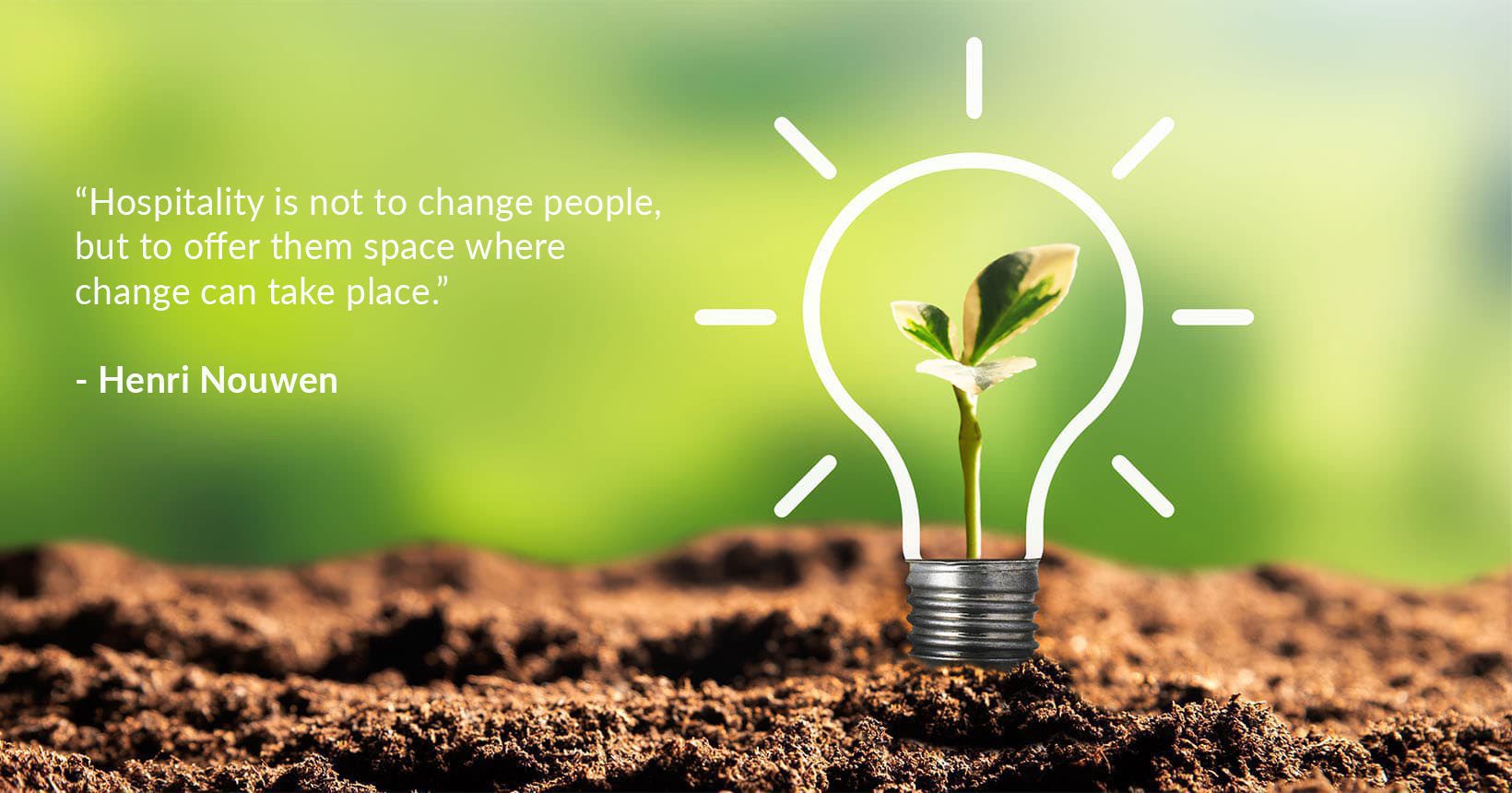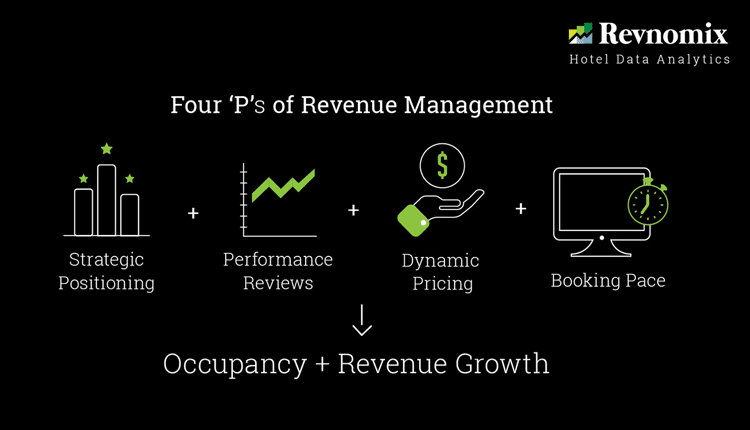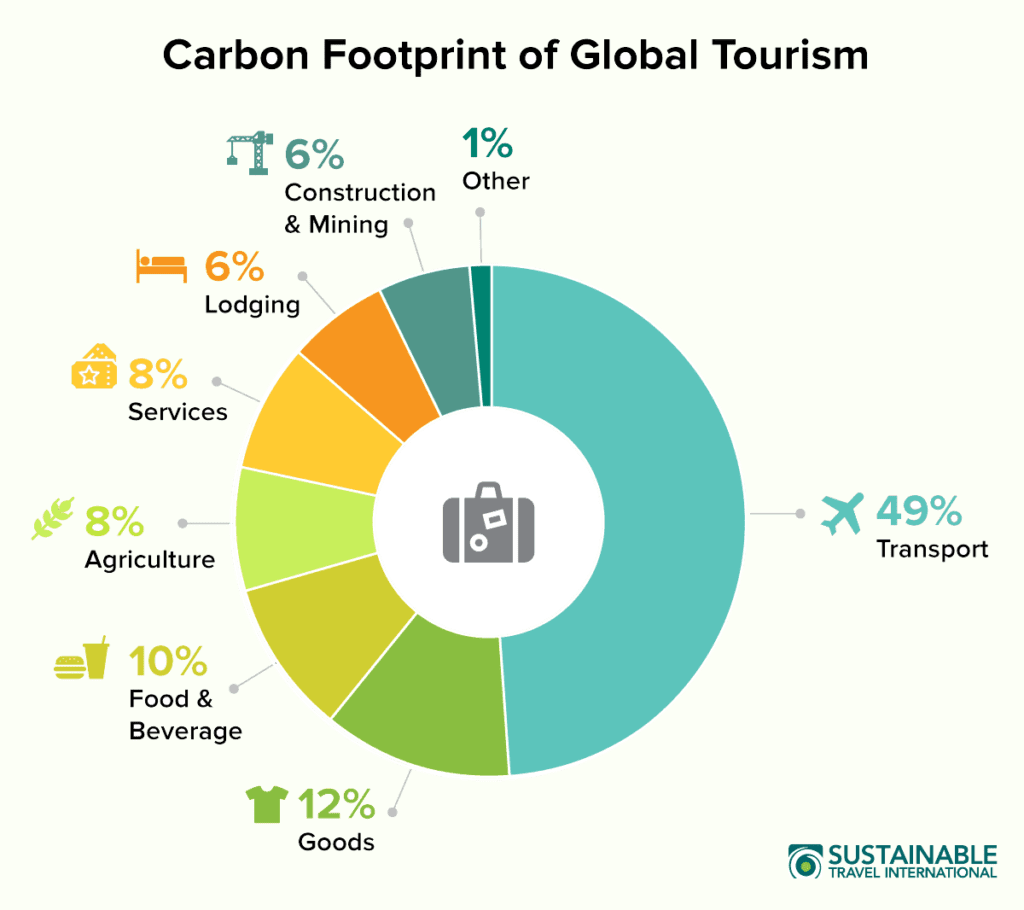
It comes as no wonder that the tourism industry is responsible for 8% of global greenhouse gases. The hotel sector is not an exception to how sustainability values are fast becoming a top concern. But what exactly does this term mean?
Sustainability in the hospitality industry is the ability of natural ecosystems to sustain life and provide resources for current and future generations. It is clear that hotels place more demands on natural resources. They rely on the same natural setting, which includes unspoiled scenery, sandy beaches, glaciers, waterfalls, coral reefs, and clean air. All of these natural features attract more guests. As a result, there is a risk that we could destroy the basis upon which this sector is based.
Other issues like rising costs, strict rules, and rivals have only urged hotel owners to embrace and make sustainability and revenue management strategies a priority. The awareness of this issue among travelers is also rising, and they demand that hotels take responsibility for it.
The sector has fast adapted to these changes and is going “green.” There are laws and policies now in place to recycle, reuse grey water, prevent waste, use less energy, and reduce carbon footprints. Do hotels provide sustainability reporting in India? In fact, all of the major players such as Hilton, Marriott, and more often publish reports that have the steps they have taken to lessen their negative impacts. Many hotels have adopted eco-friendly policies and business intelligence services to quell the effects of global warming as well.
Read Our Revenue Management Success Stories
Importance of Sustainability in the Hospitality Industry
One of the main causes of the global environmental crisis is the hotel sector. As a result, it is crucial now more than ever to implement sustainability in hotels. Here is the importance of sustainability in the hospitality industry:
1. Reduce Carbon Footprint: As per recent research, the hotel sector is behind 21% of all the carbon footprint created by tourism. The hospitality industry opportunities include waste management practices and pollution which have a severe impact on the environment. Due to their huge carbon emissions, the hotel business model has played a major role in climate change. They use a lot of water and energy as well. But, they must focus on long-term growth that reduces the effects of pollution and waste.
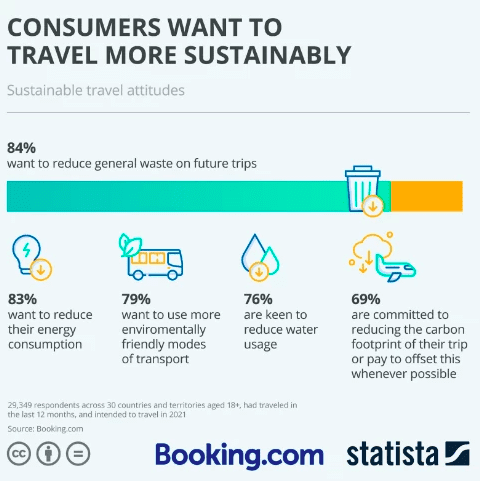
2. Travelers have become Eco-friendly: Ever since the pandemic, people have grown more conscious and concerned about the environment. As per Booking.com’s report:
· 83% of global travelers think sustainable travel is vital
· 61% say the pandemic has made them want to travel more sustainably in the future
· Findings also show that 84% of travelers want to reduce general waste
· 83% want to reduce their energy consumption (e.g. by turning off AC and lights when they are not in a room)
· 79% want to use eco-friendly modes of transport such as walking, cycling, etc.
You can start making some changes right away to fulfill your guests’ expectations. Remove goods like plastic straws or provide more information online rather than on printed materials as a first step.
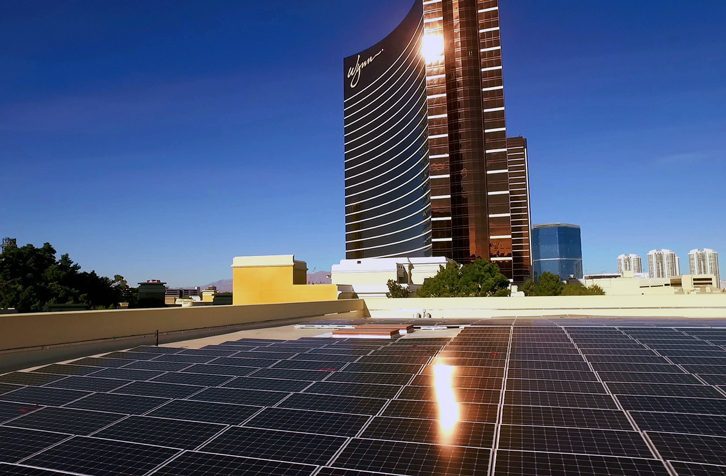
Wynn Las Vegas uses two solar-power facilities for its energy demands: one on its rooftop and another off-site that spans 160 acres.
Image credit – Wynn Resorts
Wynn Las Vegas uses two solar-power facilities for its energy demands: one on its rooftop and another off-site that spans 160 acres. Image credit – Wynn Resorts.
3. Save Costs: Adopting sustainability in the hospitality industry can reduce your operating costs while also having a positive impact on the environment. Switch to reusable or recyclable options instead of plastic, such as bamboo straws. After making your initial investment, you’ll begin to save money on supplies and waste disposal.
How energy conservation can save costs? Using energy and water-saving methods will enable you to reduce consumption and cut costs as well. Courtyard by Marriott in Lancaster now uses 100% solar energy, Hampton Inn, Bakersfield is saving $8000 per month with its solar panels, Wynn Resorts, Las Vegas with 2716 rooms, built a 160-acre solar farm that will reduce their utility bills by 75%.
4. Preserve the Environment: Everyone would agree that the main goal of traveling is to discover the world. Because of this, preserving nature and the environment is in the best interest of every hotel and hotel owner. The risk of natural disasters is rising as the number of environmental issues grows every year. This affects popular tourist spots as well as the overall tourism sector.
The US coasts are in danger of flooding and ski resorts in the Alps are losing snow. The carbon emissions also have an impact on the quality of the air, water, and food. The travel and hospitality industry should be at the forefront of going green while encouraging guests to do the same in order to prevent severe environmental impacts and ensure that people will still have a reason to travel.
5. Improve Brand Image: As per research by the Natural Marketing Institute, 58% of consumers think about how a firm’s products and services would affect the environment. This is clearly the driving force behind sustainability in the hospitality industry. So, you can improve your hotel’s brand image, which will help in revenue optimization and profits.
Read Now: Top 10 Strategies to Increase Hotel RevPAR All Year Round
10 Ways to Adopt Sustainability in the Hospitality Industry
It can take some time and careful planning to completely change your hotel into an eco-friendly one. Use the ideas below for sustainability in the hospitality industry without making large investments.
1. Improve Efficiency with Revenue Management
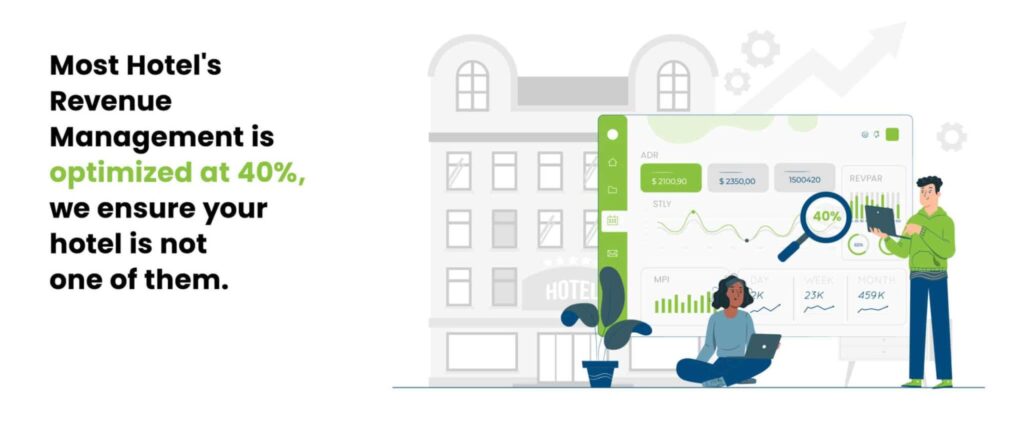
How to increase hotel revenue? The capacity to create and use accurate forecasts is a vital function of revenue management. Forecasts help hotels predict demand and future financial success. What is hotel revenue management? Hotels can increase their revenue and profits by using data analytics and revenue management tools to help them attract the right customer at the right time and at the right price.
Accurate demand forecasts can also help hotels run more efficiently, cut costs, and optimize resources, all of which can benefit the environment. Looking for top revenue management companies in India? Click below for the best revenue management software and revenue management systems.
I Want the Best Revenue Management Company
2. Automation is Key
· Automated Check-in/Check-out
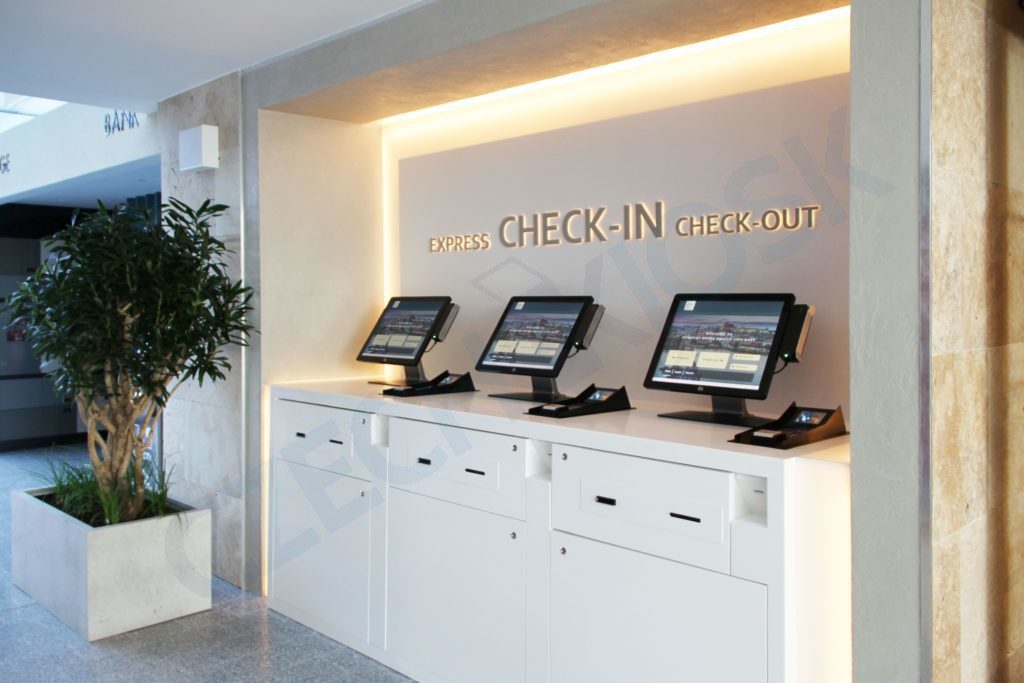
Self-service check-in and check-out for hotels.
Image credit – Czech kiosk.
You might be surprised to learn that the hospitality industry technology and smart devices play a major role in improving sustainability in the hospitality industry. It helps to optimize your hotel operations as well. Automation makes use of tech to skip the standard check-in process. This removes the need for physical keys, allowing guests to access their hotel rooms faster.
You can use fewer plastic cards and pieces of paper by setting up a digital check-in process. You can transmit a passcode and check-in guides by email or an app in place of a key or a plastic card. Your guests will value not having to wait in line and can go to their room right after arrival.
· Save Energy

Smart energy systems ensure guest satisfaction.
Image credit: Verdant Environmental Technologies
Sustainability and technology go hand in hand! Some of the greatest ways to conserve energy include energy and motion tracking, placing smart thermostats in rooms, and adopting LED light bulbs. You can stop visitors from leaving lights on by installing a one-switch system for your hotel’s lighting. In order to provide hot water, you might also install solar panels.
Planting trees all around your hotel will increase the amount of shade, which is another long-term solution. This lessens the need for guests to use AC in their rooms and keeps your hotel cool.
· Digital Guest Experience
Your guests’ stay will be more convenient if you digitize it. You can also use it to lessen the carbon footprint of your hotel because sustainability in the hospitality industry is crucial. Apps, emails, and QR codes are replacing paper bills, receipts, invoices, and other documents because guests who have paid the bill may lose any papers they may have. So, sustainability will be the new digital!
Read Now: 14 Technologies in the Hospitality Industry for Revenue Management
3. Reduce Plastic Usage

Reduce plastic pollution in the hotel industry.
Image credit – NEEF USA.
With each hotel room producing almost 200 gallons of plastic waste each month, the hotel sector is a major source of the environmental crisis. An efficient way for your hotel to reduce its carbon footprint is by reducing plastic waste. There are many waste reduction benefits. Switch to reusable glass bottles and replace plastic straws with metal or glass ones. Disposable cutlery and little toiletry bottles can also be discarded.
Use reusable cutlery or recyclable plastic objects in place of disposable ones in your hotel rooms. Set up color-coded bins all over the hotel and begin sorting trash. The same thing can be done in each room, and you should encourage your guests to do the same.
4. Water Management
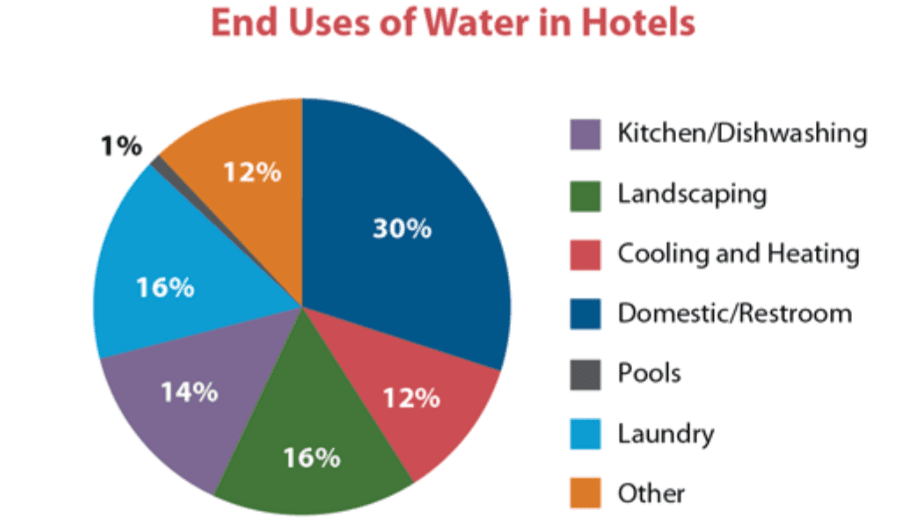
Want to know more about hospitality industry problems? The amount of water available is threatened by climate change, aquifer depletion, and pollution. Looking for water conservation ideas? Hotels need to consider and implement a linen and towel reuse program and install water-saving systems and appliances. There are many problems with water conservation. What are the best water conservation practices? Planting drought-resistant native plants and ground cover instead of grass will also help to minimize total water use.
5. Cut Back on Food Waste

A chef measures and records the amount of plate waste produced.
Image credit: Winnow Solutions.
A hotel’s demand forecast may be used to acquire goods from outside vendors and reduce waste, it can also be used to know the ideal staffing levels. The most impacted services and perishable supplies by occupancy should be identified by hotels, they should then order items keeping in mind the data on expected guest volumes.
As per Eco-Business, over 25% of all the food that goes through hotel kitchens is wasted. By better matching a hotel’s anticipated demand to buy orders for perishable foods, it is possible to reduce food waste and reduce purchasing expenses by 3 to 5 percent.
Sustainable hotels can lessen the environmental impact of their food and beverage by recycling, planting a garden, offering local and organic food, and more. Also, they can better manage food expenses, supplies, and staffing.
6. Invest in Eco-friendly Infrastructure

Image credit – Eden Group.
Looking for more ways to incorporate sustainability in the hospitality industry? Implementing renewable energy conservation model (i.e., solar and wind power) have proved beneficial for long-term sustainability ROI. These include solar panel installations, energy star certified heating and cooling systems, geothermal cooling towers, water recovery, and recycling systems.
7. Rethink Modes of Transport

Image credit – Inc42.
Your hotel is constantly being visited by travelers. Most carbon emissions associated with modes of transport are caused by this. By adopting sustainable modes of transport, let your hotel do its part.
You could switch to hybrid or electric vehicles (EVs). Rent out electric bicycles and scooters. EVs cost more to purchase right now than gas-powered cars, but you can save $6,000 to $10,000 on fuel and upkeep.
8. Educate your Guests
Finally, it’s critical to involve your guests in your efforts because they are your hotel’s primary consumers of water and energy. Promote and inform guests of sustainability in the hospitality industry and your hotel’s best practices. You can advise guests to be mindful of using water and energy. Install proper waste devices all over your hotel to promote waste separation and eco-conscious behavior.
9. Waste Management

Image credit – Katestone.
Adopt recycling programs suggested by hotel consulting services that place a premium on long-lasting items over disposables. Products like shampoo, soap, lotion, and coffee are usable only once and may negatively impact the climate. Consider moving to natural and organic toiletries that pack in biodegradable or recyclable materials. Use reusable dishes, silverware, cups, etc.
10. Use Eco-friendly Cleaning Products
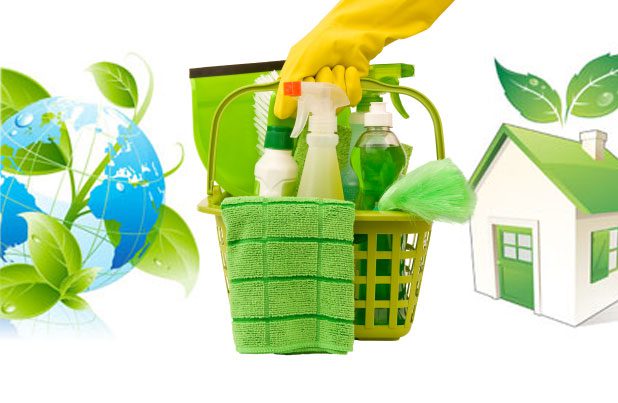
Image credit – Camden Living.
Green cleaning supplies are better for everyone’s health as well as less harmful to the environment. Natural ingredients and a lack of toxic chemicals in non-toxic cleaning supplies make them safer for guests with allergies as well. These goods are also free of materials that worsen issues with air and water pollution and have low carbon footprints.
Look for cleaning supplies that come in recyclable or bulk packaging. It ensures that your hotel’s cleaning supplies are as eco-friendly as possible for the sake of sustainability in the hospitality industry.
Which sustainable development goals does your hotel want to achieve? Tell us in the comments below.
Obstacles to Sustainability in the Hospitality Industry
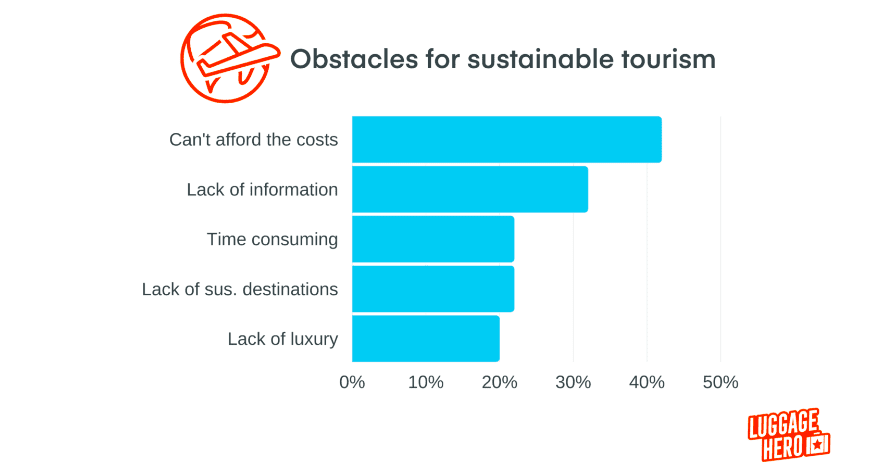
Why do some people find it hard to travel more sustainably? A study by Booking.com will make it more clear about the sustainability trends:
· 42% claimed they can’t afford the extra costs.
· 32% claimed that the lack of knowledge and information prevents them from traveling more sustainably.
· 22% thought that the amount of time needed to travel sustainably would be an obstacle.
· 22% of people said that there wouldn’t be as many options for sustainable travel places to choose from.
· 20% of people said that sustainable travel does not meet the level of luxury they are used to.
Why are some hotels unable to be more environmentally sustainable? Let’s take a look at the obstacles to sustainability in the hospitality industry.
1. High Initial Investment: Implementing and maintaining sustainability in the hospitality industry requires a huge initial investment. It takes time to start saving costs and reducing waste. Keeping in mind feasibility and customer experience, some hotels are unable to maintain sustainability practices even after investing huge amounts of money.
2. Lack of Resources & Knowledge: For successful planning, implementation, and maintenance of sustainability standards, hotels need to hire experts. It costs more money. There is a need to train the resources because of their lack of know-how as well.
3. Greenwashing: Without a doubt, you don’t want to “greenwash,” or overstate what you’re doing or have done. It’s crucial to practice becoming greener and to walk the talk. However, you should also have a third party verify your successes.
4. Lack of Demand & Awareness: Not everyone wants to travel sustainably, some travelers are looking for luxury more than others. You also need to spend money on making the guests aware of sustainable practices in hotels. It is quite possible that not many guests are aware in the first place and you need to promote it.
Our Top Clients Face No Obstacles
Future of Sustainability in the Hospitality Industry
In 2021, the market size of tourism worldwide was about 1.31 trillion U.S. dollars which plays a vital role in creating jobs. It has a major social, environmental, and economic potential, as guests are growing more and more conscious every day. Sustainability in the hospitality industry favors hotels in the best ways. They manage resources and save money on energy and water. They serve as a hospitality industry marketing tool to draw guests who care about the environment.
The future of the hospitality industry is ecotourism. Why ecotourism is important? Much of the emphasis on going green comes from guests who subscribe to an eco-conscious way of life. They prefer eco-friendly hotels with green projects over those wanting a huge amount of energy.
Many hotels are actively pursuing sustainable solutions as a top priority and will continue to do so in the future. The rising interest in sustainable values and the demand from the media, government, and guests are pushing many hotels to adopt more eco-friendly practices. Hotels are willing to adopt data analytics that ensures the careful execution of these practices as well.
The hotel sector accepts the long-term benefits of revenue management systems, water management, waste reduction, and more. As tech becomes cheaper, programs that were once out of reach for most hotels are now within reach. Looking to increase hotel revenue and for business intelligence professionals? Contact Revnomix – the best hotel revenue management company.
